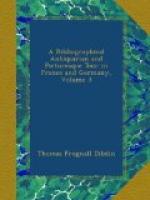It remains only to return for a few hours to Nuremberg, and then to conduct the reader to Manheim. One of the four days, during which I remained at Nuremberg, happened to be Sunday; and of all places upon the Continent, Sunday is, at Nuremberg, among the gayest and most attractive. The weather was fine, and the whole population was alternately within and without the city walls. Some Bavarian troops of cavalry were exercising near the public walks, and of course a great multitude was collected to witness their manoeuvres. On casting my eye over this concourse of people, attired in their best clothes, I was particularly struck with the head dresses of the women: composed chiefly of broad-stiffened riband, of different colours, which is made to stick out behind in a flat manner—not to be described except by the pencil of my graphic companion. The figure, seen in the frontispiece of the third volume of this work, is that of the Fille de chambre at our hotel, who was habited in her Sunday attire; and it displays in particular the riband head-dress—which was of black water-tabby sarsenet. But as these ribands are of different colours, and many of them gay and gorgeous, their appearance, in the open air—and where a great number of people is collected, and in constant motion—is that, as it were, of so many moving suns. In general, the Nurembergeoises have little pretensions to beauty: they are; however, active, civil, and intelligent.
It is rarely one takes leave of an hotel with regret when every days journey brings us sensibly nearer home. But it is due to the kind treatment and comfortable lodgings, of which I partook at Nuremberg; to say, that no traveller can leave the Cheval Rouge without at least wishing that all future inns which he visits may resemble it. We left Nuremberg after dinner, resolving to sleep at Ansbach; of which place the Margrave and Margravine were sufficiently distinguished in our own country. I had received a letter of introduction to Monsieur Le Comte de Drechsel, President de la Regence—and President of the corporation of Nuremberg—respecting the negotiation for the Boccaccio of 1472; from which, however, I augured no very favourable result. The first stage from Nuremberg is Kloster Heilbronn: where, on changing horses, the master of the inn pressed me hard to go and visit the old church, which gives the name to the village, and which was said to contain some curious old paintings by Albert Durer: but there was literally no time—and I began to be tired ... almost of Albert Durers! At Ansbach we drove to the Crown, a large and excellent inn. It was nightfall when we entered the town, but not so dark as to render the size and extent of the Margrave’s palace invisible, nor so late as to render a visit to two booksellers, after a late cup of tea, impracticable. At one place, I found something in the shape of old books, but purchased nothing—except an edition of Boccaccio’s Tales, in French, with the well known plates of Roman Le Hooge, 1701. 8vo. It was loosely bound in sorry calf, but a florin could not be considered too much for it, even in its sombre state. The other bookseller supplied, by the tender of his friendly offices, the deficiencies of his collection—which, in fact, consisted of nothing but a stock of modern publications.




